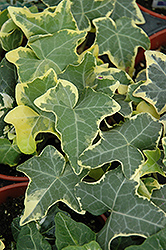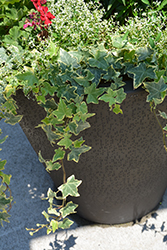make life beautiful
Plant Database
This is your garden planning resource.
Yellow Ripple Ivy
Hedera helix 'Yellow Ripple'
Height: 30 feet
Spread: 3 feet
Sunlight:
![]()
![]()
![]()
Hardiness Zone: 4a
Other Names: English Ivy
Description:
A vigorous evergreen climber or dense groundcover; beautiful deep green foliage with yellow and gray variegation will quickly cover walls, trees and fences; one of the hardiest varieties, will benefit from some protection from sun and wind in winter
Ornamental Features
Yellow Ripple Ivy has yellow-variegated dark green foliage with hints of grayish green on a plant with a spreading habit of growth. The glossy lobed leaves remain dark green throughout the winter.
Landscape Attributes
Yellow Ripple Ivy is a multi-stemmed evergreen woody vine with a twining and trailing habit of growth. Its average texture blends into the landscape, but can be balanced by one or two finer or coarser trees or shrubs for an effective composition.
This woody vine will require occasional maintenance and upkeep, and can be pruned at anytime. Gardeners should be aware of the following characteristic(s) that may warrant special consideration;
- Spreading
Yellow Ripple Ivy is recommended for the following landscape applications;
- Hedges/Screening
- General Garden Use
- Groundcover
- Container Planting
Planting & Growing
Yellow Ripple Ivy will grow to be about 30 feet tall at maturity, with a spread of 3 feet. As a climbing vine, it tends to be leggy near the base and should be underplanted with low-growing facer plants. It should be planted near a fence, trellis or other landscape structure where it can be trained to grow upwards on it, or allowed to trail off a retaining wall or slope. It grows at a fast rate, and under ideal conditions can be expected to live for approximately 30 years.
This woody vine performs well in both full sun and full shade. It prefers to grow in average to moist conditions, and shouldn't be allowed to dry out. It is not particular as to soil pH, but grows best in rich soils, and is able to handle environmental salt. It is highly tolerant of urban pollution and will even thrive in inner city environments, and will benefit from being planted in a relatively sheltered location. Consider applying a thick mulch around the root zone in winter to protect it in exposed locations or colder microclimates. This is a selected variety of a species not originally from North America, and parts of it are known to be toxic to humans and animals, so care should be exercised in planting it around children and pets.
Yellow Ripple Ivy makes a fine choice for the outdoor landscape, but it is also well-suited for use in outdoor pots and containers. Because of its spreading habit of growth, it is ideally suited for use as a 'spiller' in the 'spiller-thriller-filler' container combination; plant it near the edges where it can spill gracefully over the pot. It is even sizeable enough that it can be grown alone in a suitable container. Note that when grown in a container, it may not perform exactly as indicated on the tag - this is to be expected. Also note that when growing plants in outdoor containers and baskets, they may require more frequent waterings than they would in the yard or garden.
A NetPS Plant Finder tool

